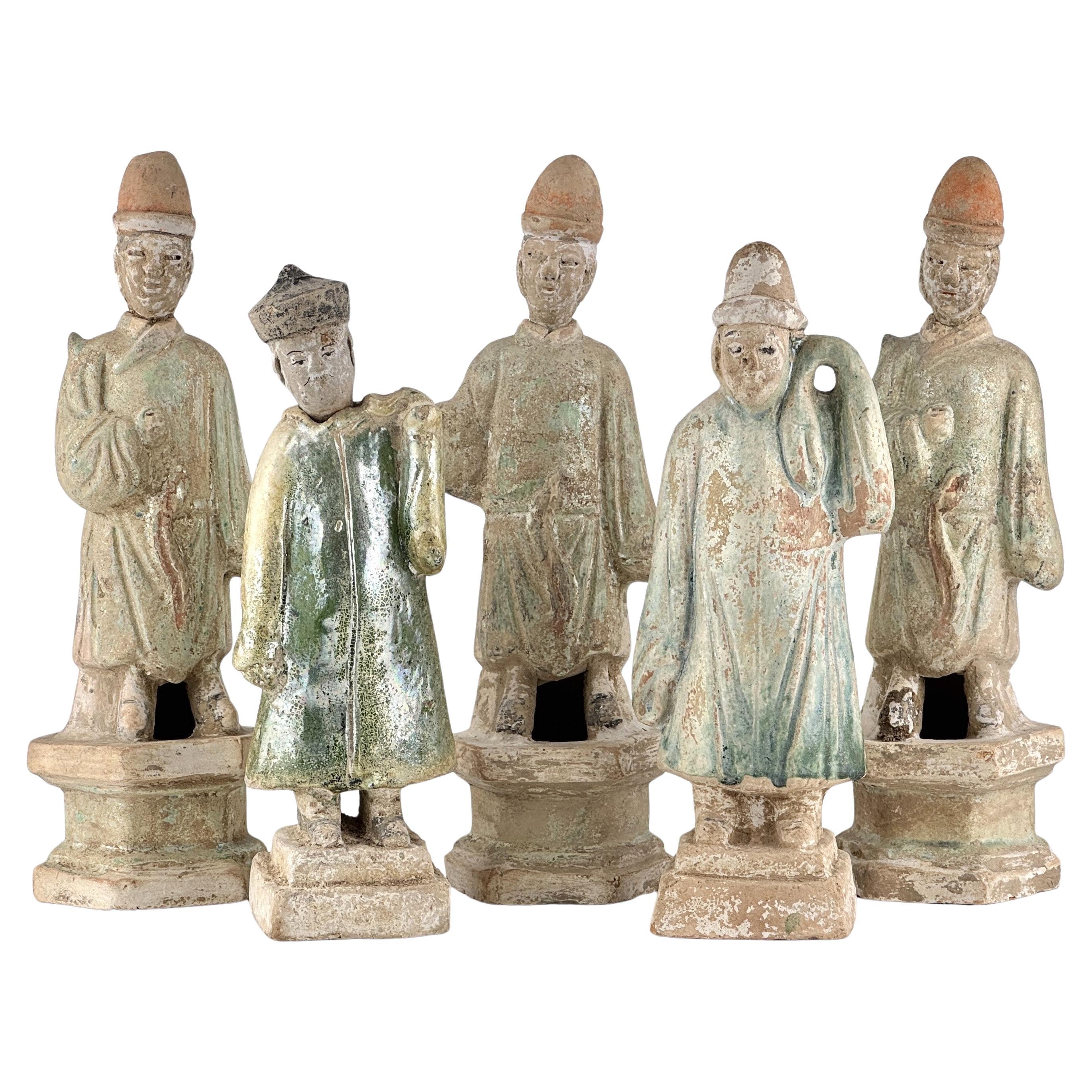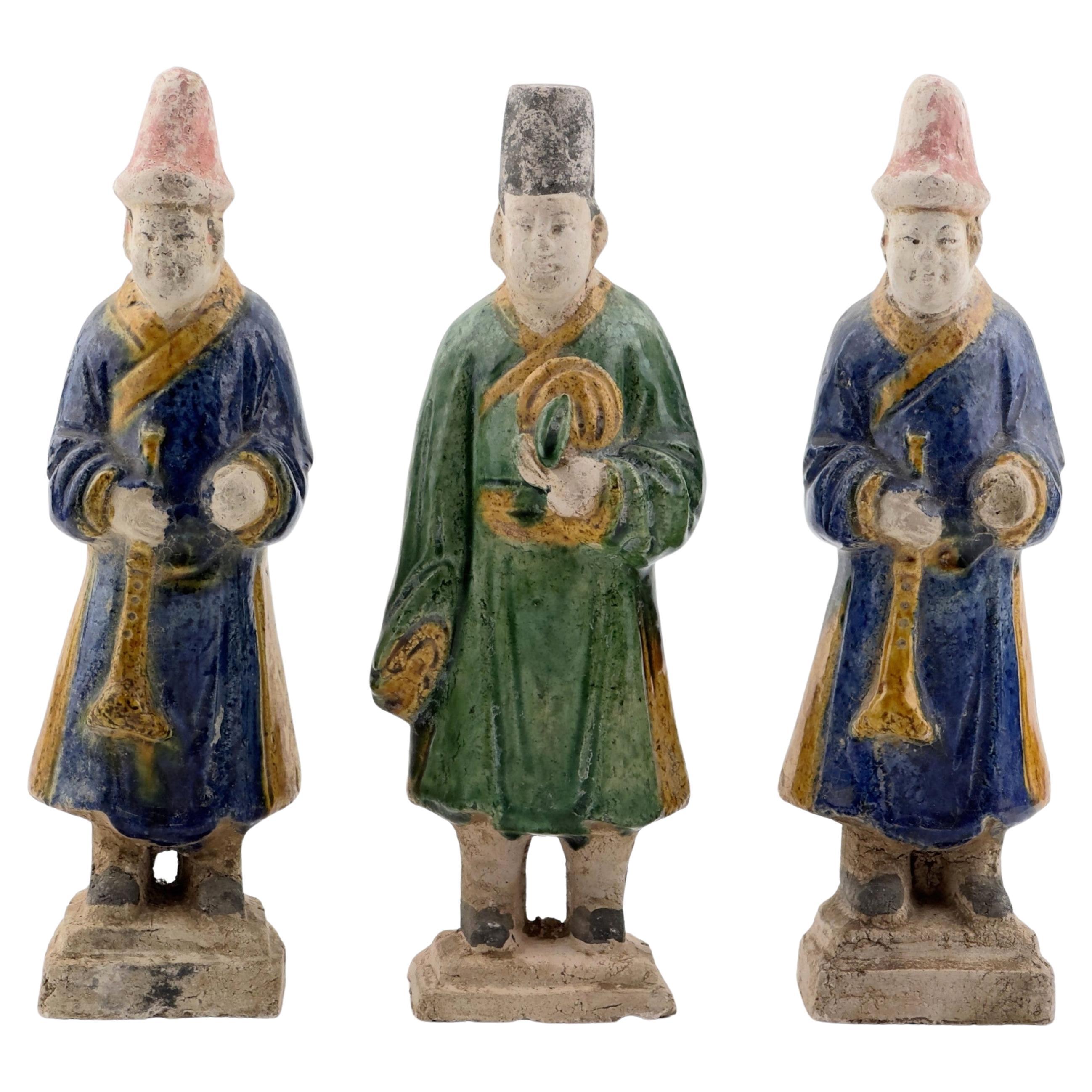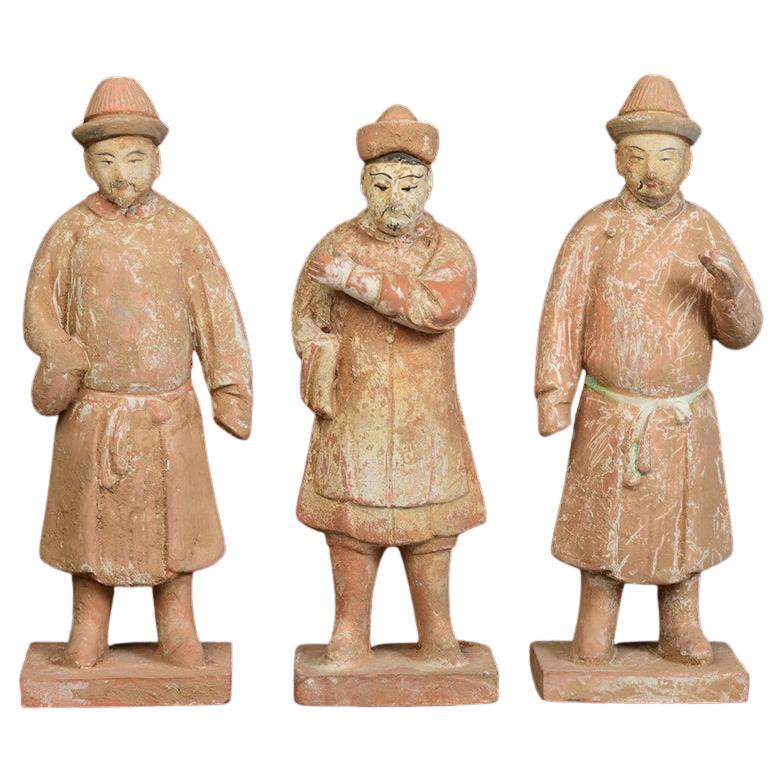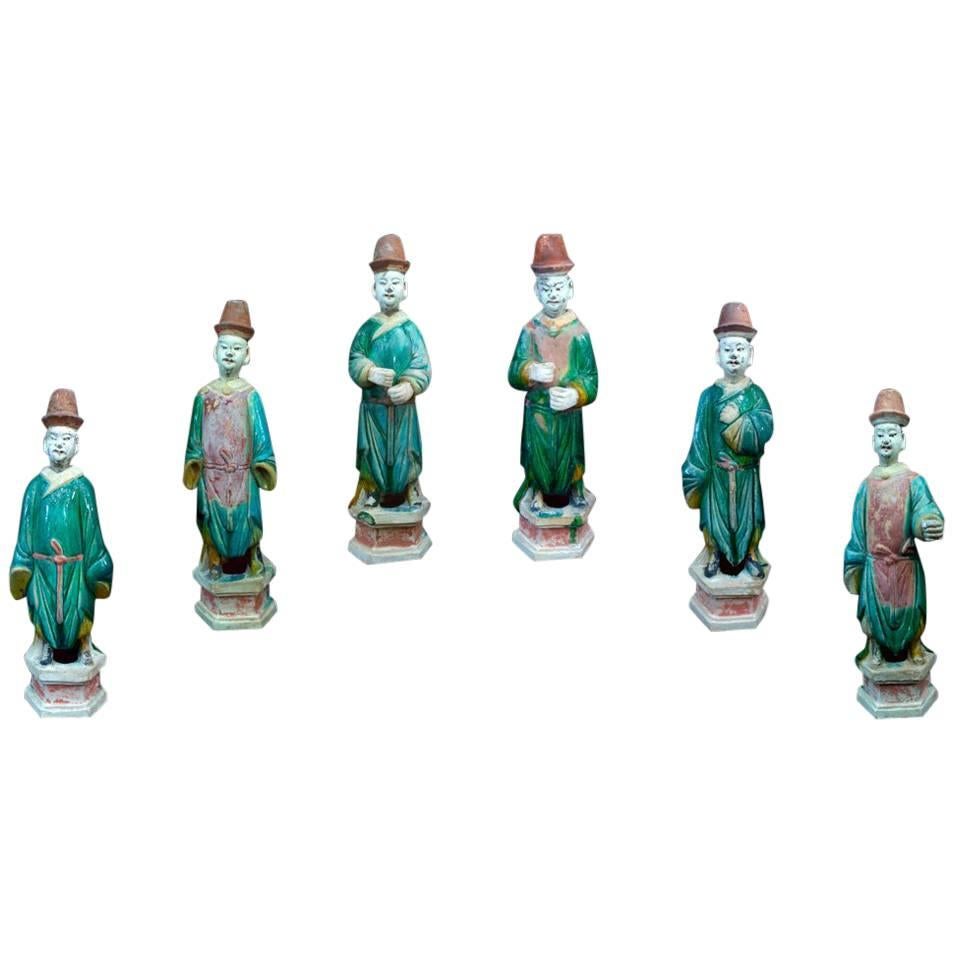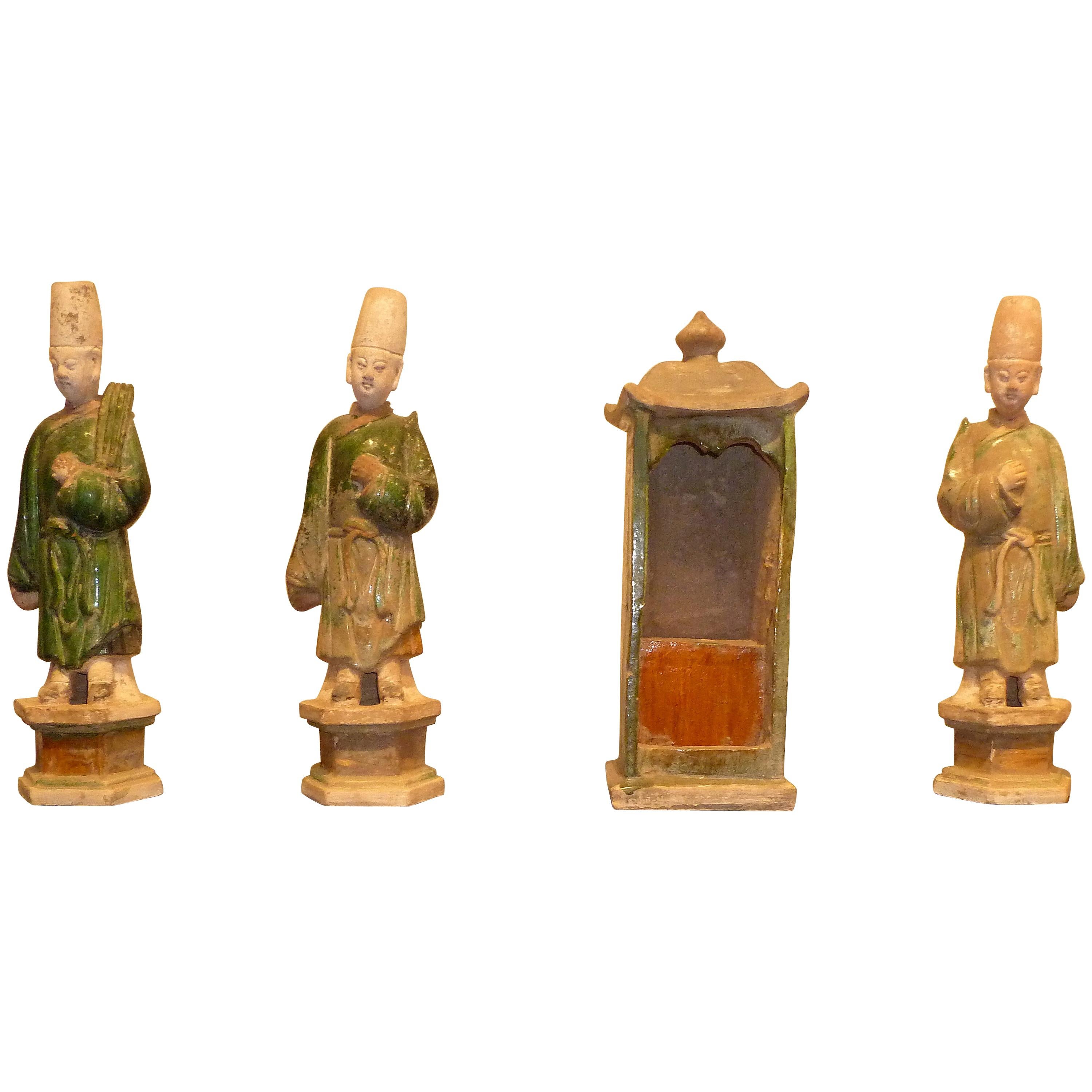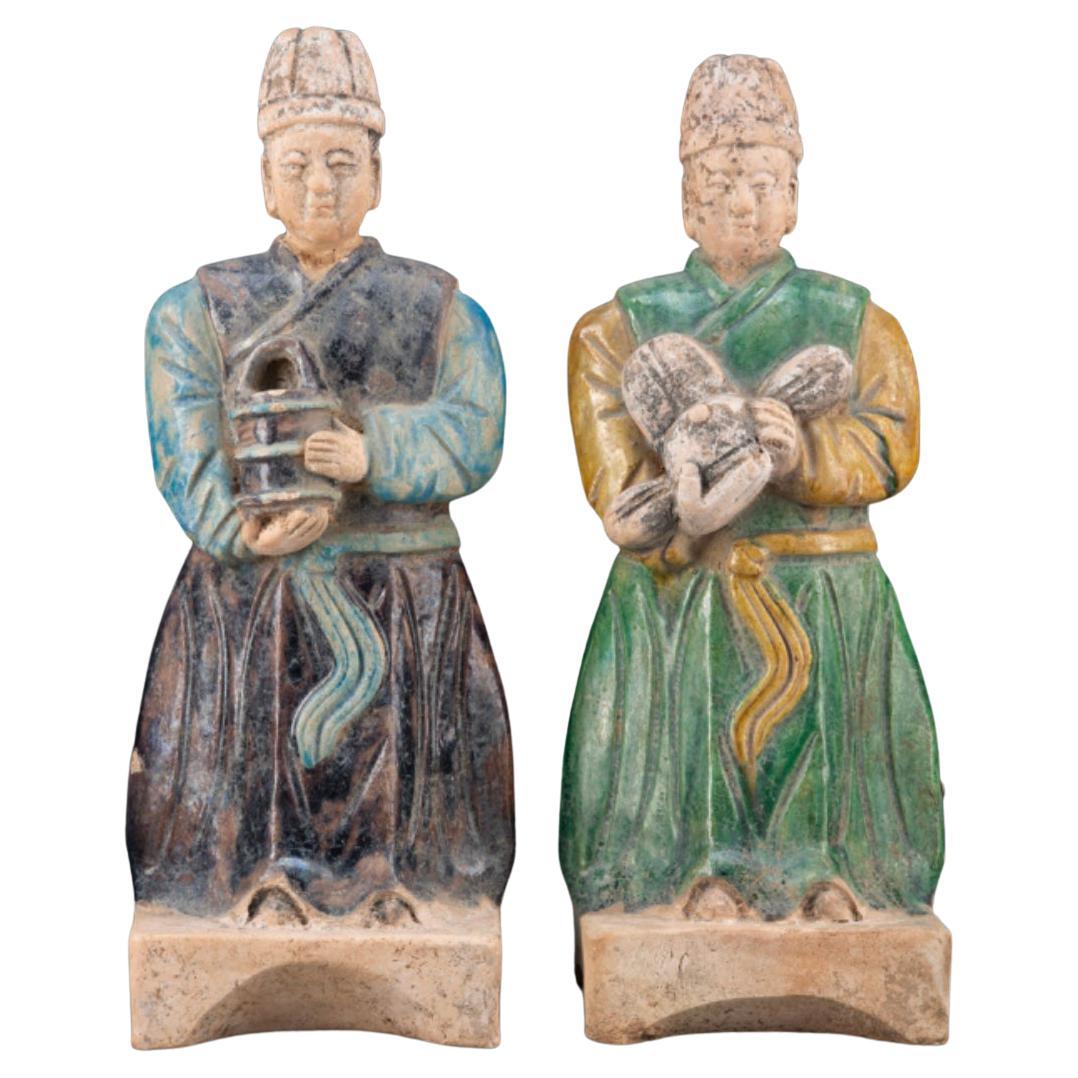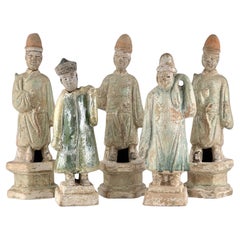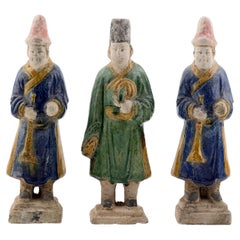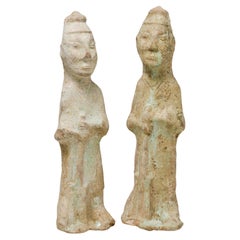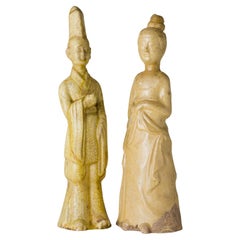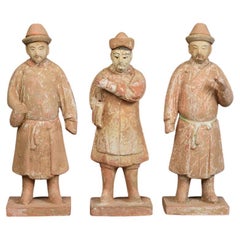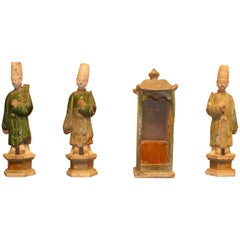Items Similar to Four Green Glazed Pottery Attendant Figures, Ming Dynasty(1368-1644)
Want more images or videos?
Request additional images or videos from the seller
1 of 15
Four Green Glazed Pottery Attendant Figures, Ming Dynasty(1368-1644)
$1,950
$3,00035% Off
£1,480.68
£2,277.9735% Off
€1,693.27
€2,605.0335% Off
CA$2,724.43
CA$4,191.4435% Off
A$3,030.16
A$4,661.7935% Off
CHF 1,582.26
CHF 2,434.2435% Off
MX$36,873.87
MX$56,729.0335% Off
NOK 20,207.84
NOK 31,088.9935% Off
SEK 18,951.39
SEK 29,155.9935% Off
DKK 12,637.52
DKK 19,442.3435% Off
Shipping
Retrieving quote...The 1stDibs Promise:
Authenticity Guarantee,
Money-Back Guarantee,
24-Hour Cancellation
About the Item
The first figure wears a short cap and takes a posture as if carrying something on the shoulder, possibly symbolizing a servant or a messenger.
The second figure wears a tall hat and clasps both hands together in front, likely representing an official or an administrator.
The third figure wears a triangular hat, with hands gathered in a respectful manner, suggesting a ceremonial attendant.
The fourth figure wears a pointed hat, with a solemn facial expression and hand posture, evoking a dignified presence.
The surface of the figurines exhibits signs of oxidation with green patina and some areas of wear, indicative of their long burial underground.
Period: Ming Dynasty, with a low possibility of being from the Han Dynasty.
Medium: Green-glazed Pottery
Type: Figure
Size : 7cm(Diameter) x 23cm(Height)
Provenance : Acquired in late 1990s from Hongkong
* Ming Dynasty Green-glazed pottery figure
Ming Dynasty green-glazed pottery figures are renowned for their vibrant green glaze, achieved by adding copper oxide to the clay, which develops its color when fired at high temperatures. These figures, often depicting humans, animals, and mythical beings, were used in tombs as offerings, in temples, or as decorations in affluent homes. Characterized by intricate designs and a glossy finish, they hold significant cultural and religious importance, symbolizing protection and companionship in the afterlife. These pieces are highly valued for their artistic merit and historical significance in the realm of Chinese ceramics.
About the Seller
4.8
Gold Seller
Premium sellers maintaining a 4.3+ rating and 24-hour response times
Established in 1999
1stDibs seller since 2023
38 sales on 1stDibs
Typical response time: <1 hour
- ShippingRetrieving quote...Shipping from: seoul, Korea South
- Return Policy
Authenticity Guarantee
In the unlikely event there’s an issue with an item’s authenticity, contact us within 1 year for a full refund. DetailsMoney-Back Guarantee
If your item is not as described, is damaged in transit, or does not arrive, contact us within 7 days for a full refund. Details24-Hour Cancellation
You have a 24-hour grace period in which to reconsider your purchase, with no questions asked.Vetted Professional Sellers
Our world-class sellers must adhere to strict standards for service and quality, maintaining the integrity of our listings.Price-Match Guarantee
If you find that a seller listed the same item for a lower price elsewhere, we’ll match it.Trusted Global Delivery
Our best-in-class carrier network provides specialized shipping options worldwide, including custom delivery.More From This Seller
View AllFive Green Glazed Pottery Attendant Figures, Ming Dynasty(1368-1644)
Located in seoul, KR
The three figurines in the back exhibit the typical form of attendants, wearing conical red hats and adopting poses where their right hands are either held in front of their chests o...
Category
Antique 15th Century and Earlier Hong Kong Ming Antiquities
Materials
Pottery
$2,925 Sale Price / set
35% Off
Three Glazed Figures of Musicians, Ming Period (1368-1644)
Located in seoul, KR
Statues of Chinese musicians crafted from terracotta, featuring glazes in green, blue with nice condition. Set on rectangular bases. Compared to other figures, musician figures are relatively rare, two figures with distinctive instrument from that era.
Period: Ming Dynasty
Medium: Green and Blue glazed Pottery
Type: Figure
Provenance : Acquired in early 2000s from Hongkong
Reference :
1) V&A Museum - Accession number C.1501913
(Type : Closely related)
* Ming Dynasty Glazed Pottery Figures
Ming Dynasty glazed pottery figures are renowned for their bold color palette, intricate detailing, and lifelike forms, distinguishing them from earlier traditions. These figures, which depict officials, warriors, animals, and mythical creatures, are characterized by high-gloss lead-based glazes in green, amber, ochre, and sancai (three-color) combinations. The thickly applied glaze pools in recesses, creating depth and enhancing sculptural details. With dynamic postures, expressive facial features, and meticulously rendered drapery, these figures reflect the period’s advancement in ceramic craftsmanship, offering a greater sense of movement and realism compared to the rigid and stylized forms of earlier dynasties.
A defining characteristic of Ming glazed pottery is its elaborate surface detailing, often achieved through raised relief elements and contrasting glazes. Equestrian figures, for example, feature carefully sculpted saddles, harnesses, and decorative embellishments, while human figures are adorned with intricate robes and headdresses. The large scale of these tomb figures, often more imposing than those from previous periods, underscores the increasing importance of funerary art during the Ming era. Unlike later Qing Dynasty figures...
Category
Antique 15th Century and Earlier Hong Kong Ming Antiquities
Materials
Pottery
$1,943 Sale Price / set
35% Off
Two Green glazed Figures Holding Pitchpork, Han dynasty
Located in seoul, KR
Han dynasty pottery tomb figure, modelled standing holding a Pitchpork in front of his body, covered in a turquoise-green glaze. These two pieces are believed to have been produced i...
Category
Antique 15th Century and Earlier Hong Kong Han Antiquities
Materials
Pottery
$2,227 Sale Price / set
25% Off
Two Straw-Glazed Pottery Figures of Court Male and Female, Sui-Tang dynasty
Located in seoul, KR
This pair of straw-glazed pottery figures represents a male and female court attendant, both elegantly attired in period fashion. The female figure wears a flowing robe with draped f...
Category
Antique 15th Century and Earlier Hong Kong Tang Antiquities
Materials
Pottery, Straw
$1,400 Sale Price / set
30% Off
Two Figures of Attendants, Ming Period(1368-1644)
Located in seoul, KR
Statues of attendants crafted from terracotta, featuring glazes in green, Set on rectangular bases.
Period: Ming Dynasty
Medium: Glazed Pottery
Type: Figure
Condition : Excellent(It has soil on it, which is presumed to be evidence of excavation)
Provenance : Acquired in late 1990s from Hongkong
Reference :
1) Indianapolis Museum of Art - Dinastia ming, figure maschili, 1368-1644
(Type : Closely related)
2) V&A Museum - Accession number FE.295:1, 2-2005
(Type : Closely related)
3) Sotheby's 01 May 2007 - The Collection Of Paul Otto Taubert & Jewellery And Decorative Arts - Lot 233
(Price range : 5,000 - 7,000 AUD / Type : Closely related)
4) Asian Art Museum, San Francisco - Object number B60P1631 - Standing Man Tomb Figure
* Ming Dynasty Glazed Pottery Figures
Ming Dynasty glazed pottery figures are renowned for their bold color palette, intricate detailing, and lifelike forms, distinguishing them from earlier traditions. These figures, which depict officials, warriors, animals, and mythical creatures, are characterized by high-gloss lead-based glazes in green, amber, ochre, and sancai (three-color) combinations. The thickly applied glaze pools in recesses, creating depth and enhancing sculptural details. With dynamic postures, expressive facial features, and meticulously rendered drapery, these figures reflect the period’s advancement in ceramic craftsmanship, offering a greater sense of movement and realism compared to the rigid and stylized forms of earlier dynasties.
A defining characteristic of Ming glazed pottery is its elaborate surface detailing, often achieved through raised relief elements and contrasting glazes. Equestrian figures, for example, feature carefully sculpted saddles, harnesses, and decorative embellishments, while human figures are adorned with intricate robes and headdresses. The large scale of these tomb figures, often more imposing than those from previous periods, underscores the increasing importance of funerary art during the Ming era. Unlike later Qing Dynasty figures...
Category
Antique 15th Century and Earlier Hong Kong Ming Antiquities
Materials
Pottery
$1,820 Sale Price
35% Off
Two Glazed Court Attendants, Ming Period (1368-1644)
Located in seoul, KR
Two finely hollow-moulded terracotta statuettes from ancient China, dating to the Ming Dynasty. The figure is depicted standing, dressed in long, flowing robes, painted in vibrant blue or green and deep amber yellow. The hair is styled into an elaborate top-knot, painted in a muted brown. Areas left unpainted would have been 'cold-painted' after firing, contrasting with the vivid fired blue or green and amber pigments. The figure is shown with the left hand raised to the chest, as if holding something, possibly an offering or incense. Figurines like this were placed in tombs to guide the deceased on their journey to the afterlife.
The Ming Dynasty was known for its exceptional artistic achievements, partly due to its economic prosperity. Since the Han Dynasty, it was customary to bury terracotta miniatures of everyday objects with the deceased. These items, known as mingqi, or "spirit utensils" and "vessels for ghosts," were believed to help and assist the deceased in the afterlife. Mingqi were crafted in the form of cooking utensils, miniature replicas of houses, temples, furniture, and other items. Anthropomorphic and zoomorphic terracotta figures were also popular, designed to assist, entertain, and recreate the living world for the deceased.
Period: Ming Dynasty
Medium: Green/blue-glazed Pottery
Type: Figure
Provenance : Acquired in late 1990s from Hongkong
Reference :
1) Ancient & Oriental - Terracotta Tomb Attendants
(Type : Highly related)
2) La Maison De La Petite Sara S.r.l. - Archaeology section - A Black glazed Terracotta Statuette, Servant with Trumpet, Ming Dynasty
(Price realised : 700 GBP / Type : Highly related)
* Ming Dynasty Glazed Pottery Figures
Ming Dynasty glazed pottery figures are renowned for their bold color palette, intricate detailing, and lifelike forms, distinguishing them from earlier traditions. These figures, which depict officials, warriors, animals, and mythical creatures, are characterized by high-gloss lead-based glazes in green, amber, ochre, and sancai (three-color) combinations. The thickly applied glaze pools in recesses, creating depth and enhancing sculptural details. With dynamic postures, expressive facial features, and meticulously rendered drapery, these figures reflect the period’s advancement in ceramic craftsmanship, offering a greater sense of movement and realism compared to the rigid and stylized forms of earlier dynasties.
A defining characteristic of Ming glazed pottery is its elaborate surface detailing, often achieved through raised relief elements and contrasting glazes. Equestrian figures, for example, feature carefully sculpted saddles, harnesses, and decorative embellishments, while human figures are adorned with intricate robes and headdresses. The large scale of these tomb figures, often more imposing than those from previous periods, underscores the increasing importance of funerary art during the Ming era. Unlike later Qing Dynasty figures...
Category
Antique 15th Century and Earlier Hong Kong Ming Antiquities
Materials
Pottery
$1,943 Sale Price / set
35% Off
You May Also Like
Ming Dynasty, A Set of Antique Chinese Pottery Court Man
Located in Sampantawong, TH
A set of Chinese pottery standing court man.
Age: China, Ming Dynasty, A.D. 1368 - 1644
Size: Height 25.9 - 27.4 C.M. / Width 8.9 - 9.1 C.M.
Condition: well-preserved old burial...
Category
Antique 15th Century and Earlier Chinese Antiquities
Materials
Pottery
$1,920 Sale Price / set
20% Off
6 Elegant Ming Dynasty Court Attendants in Glazed Terracotta, China 1368-1644 AD
Located in San Pedro Garza Garcia, Nuevo Leon
A fine set of a six court attendants as in the Forbidden City of Beijing, elegantly dressed in a Green & Red Daopao – a traditional men’s formal attire from the Ming Dynasty dated 1368-1643 A.D. – with glazed robes and Red Pigment remains in their hat and belts. They stand in an honorary posture atop a red plinth, some with orifices in their hands, where spirit objects were placed to comfort or satisfy the deceased. The heads are detachable, as often seen on the larger figures from this period.
They are accompanied by a Certificate of Authenticity, and Certificate of Expertise by Jean-Yves Nathan - a leading authority specialized in Far East Archaeology from the CEDEA (The European Confederation of Art Experts).
Burial figurines of graceful dancers, mystical beasts, and everyday objects reveal both how people in early China approached death and how they lived. Since people viewed the afterlife as an extension of worldly life, these figurines, called mingqi, sometimes referred as “spirit utensils” or “vessels of ghosts” disclose details of routine existence and provide insights into belief systems over a thousand-year period.
The Ming dynasty was the ruling dynasty of China – then known as the Empire of the Great Ming – for 276 years (1368–1644 AD). Founded by Chu Yuan-chang, the rebel leader that was successful in removing the mongols from the throne. Chinese control was re-asserted in China and eastern Asia. Literature became more important, schools were created, and the justice system was reformed. The Ming dynasty is described by some as "one of the greatest eras of orderly government and social stability in human history,” was the last imperial dynasty in China ruled by ethnic Han Chinese.
The practice of burying ceramic objects with the deceased went into decline from the 10th to the 14th Century AD. There was a revival in placing miniature representations of glazed terracotta objects such a furniture, food offerings, horses, miniature statues...
Category
Antique 15th Century and Earlier Chinese Ming Antiquities
Materials
Terracotta
Set of Refine Ming Dynasty Green Glazed Attendants and a Sedan Chair
Located in Greenwich, CT
A set of very refined green glazed attendants and one sedan chair, each with benevolent facial expression, beautiful colors and lines, Ming dynasty 1368-1644. Three glazed attendants...
Category
Antique 15th Century and Earlier Chinese Ming Sculptures and Carvings
Materials
Pottery
Chinese Ming Dynasty Glazed Pottery Attendants
Located in Dallas, TX
A pair of Chinese Ming Dynasty glazed earthenware figure of Attendant
The condition of these 5 century old glazed pottery tomb figures is outstand...
Category
Antique 16th Century Chinese Ming Figurative Sculptures
Materials
Pottery
Three Ancient Terracotta Sculptures, China Ming Period
Located in Roma, IT
This Chinese terracotta group of figures is made up of three figures of Chinese dignitaries in glazed green and ocher terracotta on hexagonal bases and removable heads.
From the d...
Category
Antique 16th Century Chinese Sculptures and Carvings
Materials
Terracotta
$7,380 Sale Price / set
30% Off
Ming Dynasty Sancai Glazed Dignitary Tomb Figures
Located in Dallas, TX
A Pair of Chinese Enameled Sancai Glazed Pottery Attendant Figures Representing Dignitaries.
Ming Dynasty Period. Circa 1600AD
Dimensions; 23 x 5.5 x 5.25 inches (58.4 x 13.7 x 13.3 ...
Category
Antique 16th Century Chinese Ming Figurative Sculptures
Materials
Pottery
More Ways To Browse
Tall Art Pottery
Ming Green
Chinese Green Glazed Pottery
Chinese Glazed Figure
Chinese Ming Pottery
Ming Dynasty Glazed
Tomb Figure
Ming Chinese Figures
Chinese Pottery Figure
Ming Dynasty Pottery
Antique Chinese Figurines
Green Ming Dynasty
Ming Figure
Chinese Green Glazed Animal
Chinese Glazed Figurine
Ceremonial Hats
Ming Dynasty Figures
Clay Figurine
